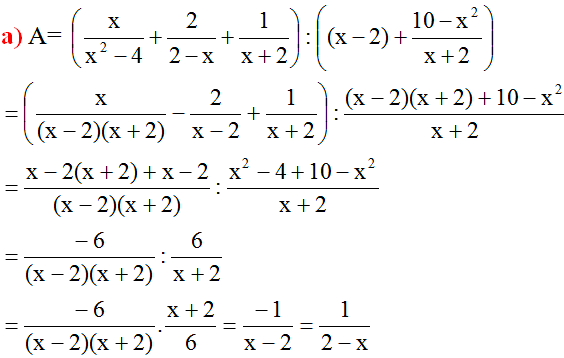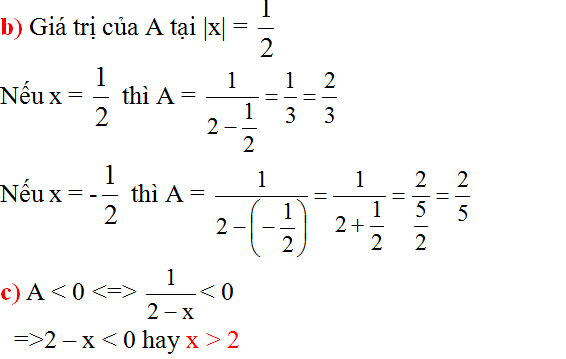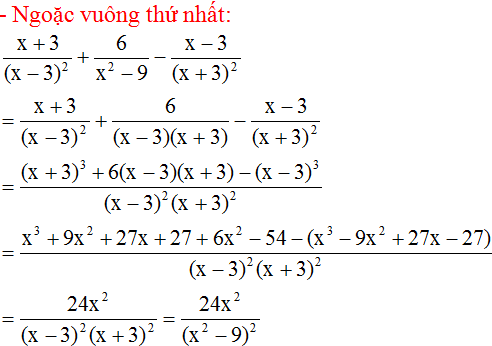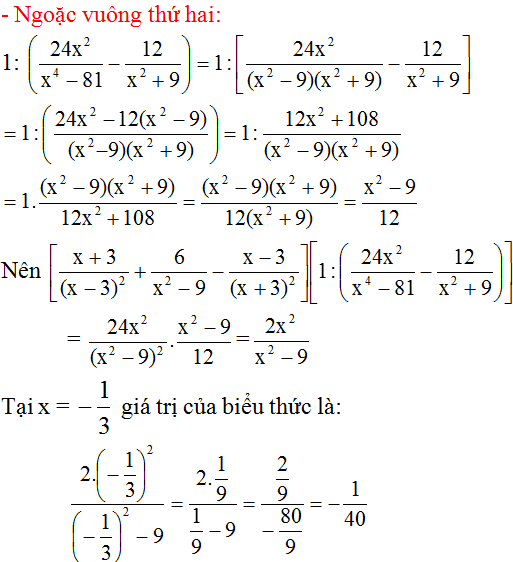Hãy nhập câu hỏi của bạn vào đây, nếu là tài khoản VIP, bạn sẽ được ưu tiên trả lời.

Lời giải của bạn Nhật Linh đúng rồi, tuy nhiên cần thêm điều kiện để A có nghĩa: \(x\ne\pm2\)

a,ĐK: \(\hept{\begin{cases}x\ne0\\x\ne\pm3\end{cases}}\)
b, \(A=\left(\frac{9}{x\left(x-3\right)\left(x+3\right)}+\frac{1}{x+3}\right):\left(\frac{x-3}{x\left(x+3\right)}-\frac{x}{3\left(x+3\right)}\right)\)
\(=\frac{9+x\left(x-3\right)}{x\left(x-3\right)\left(x+3\right)}:\frac{3\left(x-3\right)-x^2}{3x\left(x+3\right)}\)
\(=\frac{x^2-3x+9}{x\left(x-3\right)\left(x+3\right)}.\frac{3x\left(x+3\right)}{-x^2+3x-9}=\frac{-3}{x-3}\)
c, Với x = 4 thỏa mãn ĐKXĐ thì
\(A=\frac{-3}{4-3}=-3\)
d, \(A\in Z\Rightarrow-3⋮\left(x-3\right)\)
\(\Rightarrow x-3\inƯ\left(-3\right)=\left\{-3;-1;1;3\right\}\Rightarrow x\in\left\{0;2;4;6\right\}\)
Mà \(x\ne0\Rightarrow x\in\left\{2;4;6\right\}\)

ĐKXĐ : \(x\ne\left\{1;0\right\}\)
a) \(P=\left(\dfrac{\left(x-1\right)^2}{3x+\left(x-1\right)^2}-\dfrac{1-2x^2+4x}{x^3-1}+\dfrac{1}{x-1}\right):\dfrac{2x}{x^3+x}\)
\(P=\left(\dfrac{\left(x-1\right)^2}{x^2+x+1}-\dfrac{1-2x^2+4x}{\left(x-1\right)\left(x^2+x+1\right)}+\dfrac{1}{x-1}\right)\cdot\dfrac{x\left(x^2+1\right)}{2x}\)
\(P=\left(\dfrac{\left(x-1\right)\left(x-1\right)^2}{\left(x-1\right)\left(x^2+x+1\right)}-\dfrac{1-2x^2+4x}{\left(x-1\right)\left(x^2+x+1\right)}+\dfrac{x^2+x+1}{\left(x-1\right)\left(x^2+x+1\right)}\right)\cdot\dfrac{x^2+1}{2}\)
\(P=\left(\dfrac{\left(x-1\right)^3-1+2x^2-4x+x^2+x+1}{\left(x-1\right)\left(x^2+x+1\right)}\right)\cdot\dfrac{x^2+1}{2}\)
\(P=\left(\dfrac{x^3-3x^2+3x-1-1+2x^2-4x+x^2+x+1}{\left(x-1\right)\left(x^2+x+1\right)}\right)\cdot\dfrac{x^2+1}{2}\)
\(P=\left(\dfrac{x^3-1}{x^3-1}\right)\cdot\dfrac{x^2+1}{2}\)
\(P=1\cdot\dfrac{x^2+1}{2}\)
\(P=\dfrac{x^2+1}{2}\)
b) Vì \(x^2\ge0\forall x\)
\(\Rightarrow P\ge\dfrac{1}{2}\)
Dấu "=" xảy ra \(\Leftrightarrow x=0\)
Mà ĐKXĐ \(x\ne0\)
=> ... đến đây ko biết làm :v ![]()
AI BIẾT LÀM HỘ ĐI
Cái này mk chưa học nên cx chưa rõ cách làm chính xác mong bạn thông cảm :)

a: \(M=\left[\dfrac{x^2-2x+1}{x^2+x+1}+\dfrac{2x^2-4x-1}{\left(x-1\right)\left(x^2+x+1\right)}+\dfrac{1}{x-1}\right]\cdot\dfrac{x^2+1}{2}\)
\(=\dfrac{x^3-3x^2+3x-1+2x^2-4x-1+x^2+x+1}{\left(x-1\right)\left(x^2+x+1\right)}\cdot\dfrac{x^2+1}{2}\)
\(=\dfrac{x^2+1}{2}\)

mk nghỉ bài này đề sai
a) điều kiện : \(x\ne0;x\ne-1;x\ne2\)
ta có : \(A=1+\left(\dfrac{x+1}{x^3+1}-\dfrac{1}{x-x^2-1}+\dfrac{2}{x+1}\right):\dfrac{x^3-2x^2}{x^3-x^2+x}\)
\(\Leftrightarrow A=1+\left(\dfrac{x+1}{\left(x+1\right)\left(x^2-x+1\right)}+\dfrac{1}{x^2-x+1}+\dfrac{2}{x+1}\right):\dfrac{x\left(x-2\right)}{x^2-x+1}\) \(\Leftrightarrow A=1+\left(\dfrac{x+1+x+1+2\left(x^2-x+1\right)}{\left(x+1\right)\left(x^2-x+1\right)}\right):\dfrac{x\left(x-2\right)}{x^2-x+1}\) \(\Leftrightarrow A=1+\left(\dfrac{2x^2+4}{\left(x+1\right)\left(x^2-x+1\right)}\right):\dfrac{x^2-x+1}{x\left(x-2\right)}\) \(\Leftrightarrow A=1+\dfrac{2x^2+4}{x\left(x+1\right)\left(x-2\right)}=\dfrac{2x^2+4+x\left(x+1\right)\left(x-2\right)}{x\left(x+1\right)\left(x-2\right)}\)\(\Leftrightarrow A=\dfrac{x^3+x^2-2x+4}{x\left(x+1\right)\left(x-2\right)}\)
b) ta có : \(\left|x-\dfrac{3}{4}\right|=\dfrac{5}{4}\) \(\Leftrightarrow\left[{}\begin{matrix}x-\dfrac{3}{4}=\dfrac{5}{4}\\x-\dfrac{3}{4}=\dfrac{-5}{4}\end{matrix}\right.\) \(\Leftrightarrow\left[{}\begin{matrix}x=2\left(L\right)\\x=\dfrac{-1}{2}\end{matrix}\right.\)
thế vào \(A\) ta có : \(A=\dfrac{41}{5}\)
vậy ...............................................................................................................

Câu 1 :
a) Rút gọn P :
\(P=\dfrac{x+1}{3x-x^2}:\left(\dfrac{3+x}{3-x}-\dfrac{3-x}{3+x}-\dfrac{12x^2}{x^2-9}\right)\)
\(P=\dfrac{x+1}{x\left(3-x\right)}:\left[\dfrac{\left(3+x\right)^2}{\left(3-x\right)\left(3+x\right)}-\dfrac{\left(3-x\right)^2}{\left(3-x\right)\left(3+x\right)}-\dfrac{12x^2}{\left(3-x\right)\left(3+x\right)}\right]\)
\(P=\dfrac{x+1}{x\left(3-x\right)}:\left(\dfrac{9+6x+x^2-9+6x-x^2-12x^2}{\left(3-x\right)\left(3+x\right)}\right)\)
\(P=\dfrac{x+1}{x\left(3-x\right)}:\dfrac{12x-12x^2}{\left(3-x\right)\left(x+3\right)}\)
\(P=\dfrac{x+1}{x\left(3-x\right)}.\dfrac{\left(3-x\right)\left(x+3\right)}{12x\left(1-x\right)}\)
\(P=\dfrac{\left(x+1\right)\left(x+3\right)}{12x^2\left(1-x\right)}\)






ĐKXĐ: \(x\notin\left\{-1;-\dfrac{1}{2}\right\}\)
a) Ta có: \(P=\left(\dfrac{2x}{x^3+x^2+x+1}+\dfrac{1}{x+1}\right):\left(1+\dfrac{x}{x+1}\right)\)
\(=\left(\dfrac{2x}{\left(x+1\right)\left(x^2+1\right)}+\dfrac{x^2+1}{\left(x^2+1\right)\left(x+1\right)}\right):\left(\dfrac{x+1+x}{x+1}\right)\)
\(=\dfrac{x^2+2x+1}{\left(x+1\right)\left(x^2+1\right)}:\dfrac{2x+1}{x+1}\)
\(=\dfrac{\left(x+1\right)^2}{\left(x+1\right)\left(x^2+1\right)}\cdot\dfrac{x+1}{2x+1}\)
\(=\dfrac{x^2+2x+1}{\left(2x+1\right)\left(x^2+1\right)}\)
b) Vì \(x=\dfrac{1}{4}\) thỏa mãn ĐKXĐ
nên Thay \(x=\dfrac{1}{4}\) vào biểu thức \(P=\dfrac{x^2+2x+1}{\left(2x+1\right)\left(x^2+1\right)}\), ta được:
\(P=\left[\left(\dfrac{1}{4}\right)^2+2\cdot\dfrac{1}{4}+1\right]:\left[\left(2\cdot\dfrac{1}{4}+1\right)\left(\dfrac{1}{16}+1\right)\right]\)
\(=\left(\dfrac{1}{16}+\dfrac{1}{2}+1\right):\left[\left(\dfrac{1}{2}+1\right)\left(\dfrac{1}{16}+1\right)\right]\)
\(=\dfrac{25}{16}:\dfrac{51}{32}=\dfrac{25}{16}\cdot\dfrac{32}{51}=\dfrac{50}{51}\)
Vậy: Khi \(x=\dfrac{1}{4}\) thì \(P=\dfrac{50}{51}\)